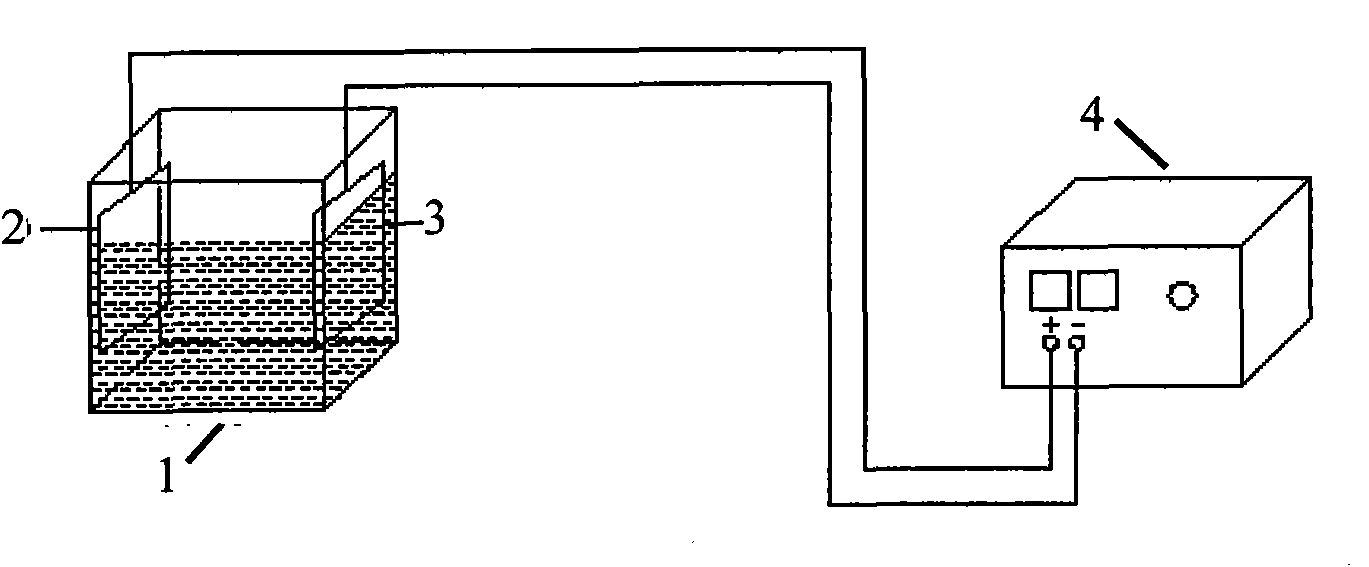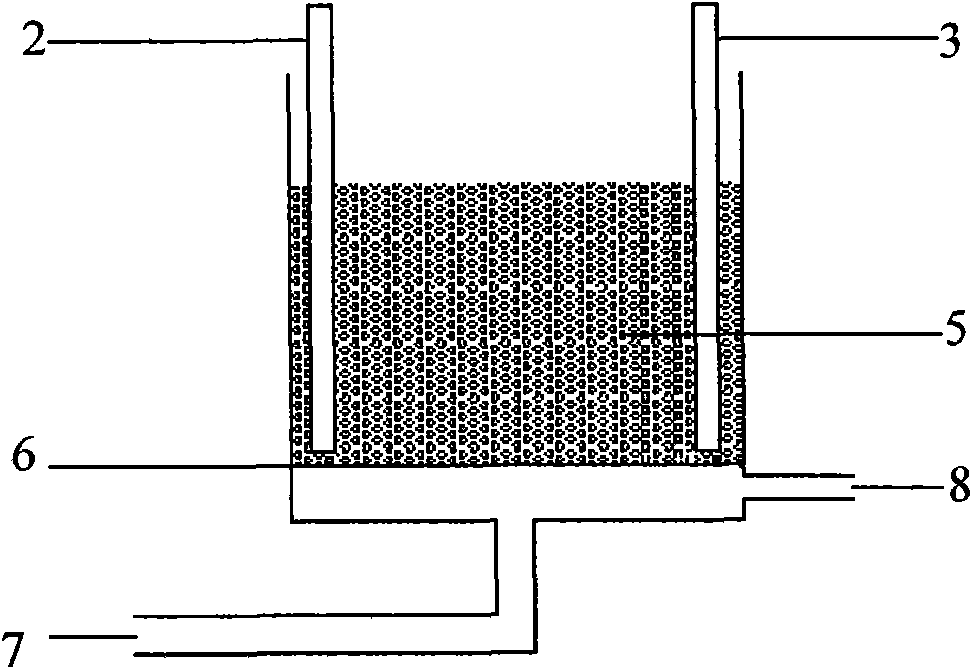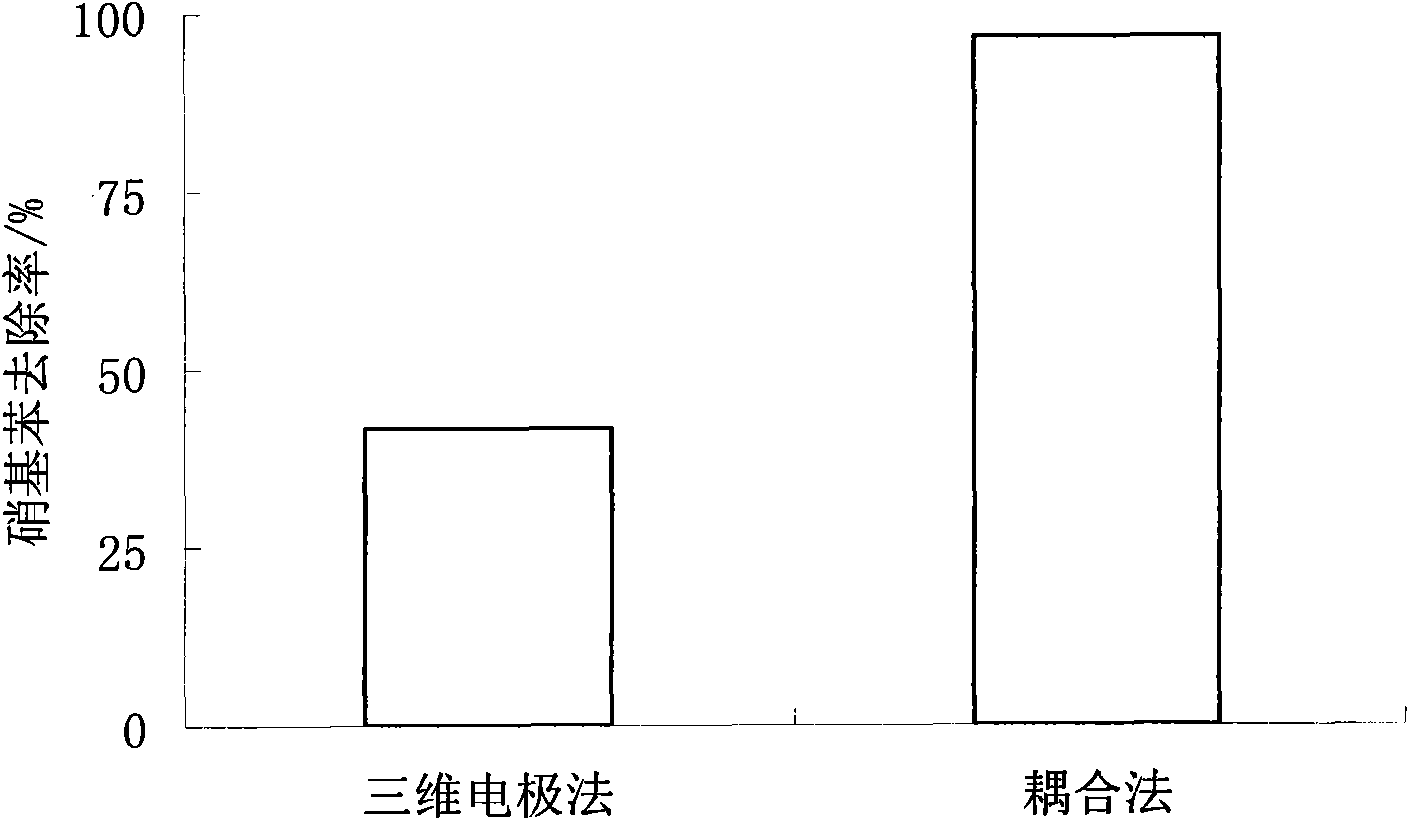Method for degrading nitrobenzene waste water by polyphase electrocatalytic oxidation-Fenton coupling process and reactor thereof
A catalytic oxidation, nitrobenzene technology, applied in chemical instruments and methods, oxidized water/sewage treatment, water/sewage multi-stage treatment, etc. problems, to achieve the effect of ensuring compliance with emission standards
- Summary
- Abstract
- Description
- Claims
- Application Information
AI Technical Summary
Problems solved by technology
Method used
Image
Examples
Embodiment 1
[0038] In terms of weight percentage, based on activated carbon and iron filings accounting for 98% of the electrode particles, 0.01% platinum oxide, 0.02% palladium oxide, 0.1% nickel oxide, 0.2% cobalt oxide, 0.3% Zinc oxide, 0.37% copper oxide and 1% manganese dioxide are used as solid catalysts, and activated carbon or / and iron filings and solid catalysts are fully mixed to form particle electrodes with a particle size of 4-6mm as electrodes; cathode electrode plates Graphite is used, the anode electrode plate is made of RuO 2 -IrO2 -TiO 2 / Ti, as the feeding electrode, the initial pH of nitrobenzene wastewater is 3, the distance between the plates is 6cm, the cell voltage is 30V, Fe 2+ The dosage is 1.0g / L (add in 6 times), the aeration volume is 0.8m 3 Under the condition of COD 18000mg / L and nitrobenzene content 1300mg / L, the nitrobenzene wastewater was treated for 90 minutes, and the removal rates of COD and nitrobenzene were 93.1% and 96.5%, respectively.
[0039] ...
Embodiment 2
[0041] In terms of weight percentage, based on activated carbon and iron filings accounting for 94% of the electrode particles, 0.01% platinum oxide, 0.02% palladium oxide, 0.2% nickel oxide, 0.3% cobalt oxide, 0.47% Zinc oxide, 1% copper oxide and 4% manganese dioxide are used as solid catalysts, and activated carbon or / and iron filings and solid catalysts are fully mixed to form particle electrodes with a particle size of 4-6mm as working electrodes; cathode electrodes The plate is made of graphite, and the anode electrode plate is made of RuO 2 -IrO 2 -TiO 2 / Ti, as the feeding electrode, the initial pH of nitrobenzene wastewater is 2, the distance between the plates is 4cm, the cell voltage is 20V, Fe 2+ The dosage is 0.8g / L (add in 4 times), the aeration volume is 0.6m 3 Under the condition of COD 3440mg / L, the rosin production wastewater was treated for 90 minutes, and the removal rate of COD was 82.5%.
Embodiment 3
[0043] In terms of weight percentage, iron filings accounting for 96% of the electrode particles are used as the substrate, and 0.01% of platinum oxide, 0.02% of palladium oxide, 0.2% of nickel oxide, 0.3% of cobalt oxide, and 0.47% of zinc Oxide, 1% copper oxide and 2% manganese dioxide are used as solid catalysts, and active carbon or / and iron filings and solid catalysts are fully mixed into particle electrodes with a particle size of 4-6mm as working electrodes; activated carbon or / Fully mix with iron filings and solid catalyst to form a particle electrode with a particle size of 4-6mm as the working electrode; the cathode electrode plate is made of graphite, and the anode electrode plate is made of RuO 2 -IrO 2 -TiO 2 / Ti, as the feeding electrode, as the feeding electrode, at the initial pH of 4, the distance between the plates is 8cm, the cell voltage is 40V, Fe 2+ The dosage is 1.2g / L (add in 5 times), the aeration volume is 1.0m 3 Under the condition of COD 273000m...
PUM
| Property | Measurement | Unit |
|---|---|---|
| Particle size | aaaaa | aaaaa |
Abstract
Description
Claims
Application Information
 Login to View More
Login to View More - R&D
- Intellectual Property
- Life Sciences
- Materials
- Tech Scout
- Unparalleled Data Quality
- Higher Quality Content
- 60% Fewer Hallucinations
Browse by: Latest US Patents, China's latest patents, Technical Efficacy Thesaurus, Application Domain, Technology Topic, Popular Technical Reports.
© 2025 PatSnap. All rights reserved.Legal|Privacy policy|Modern Slavery Act Transparency Statement|Sitemap|About US| Contact US: help@patsnap.com



